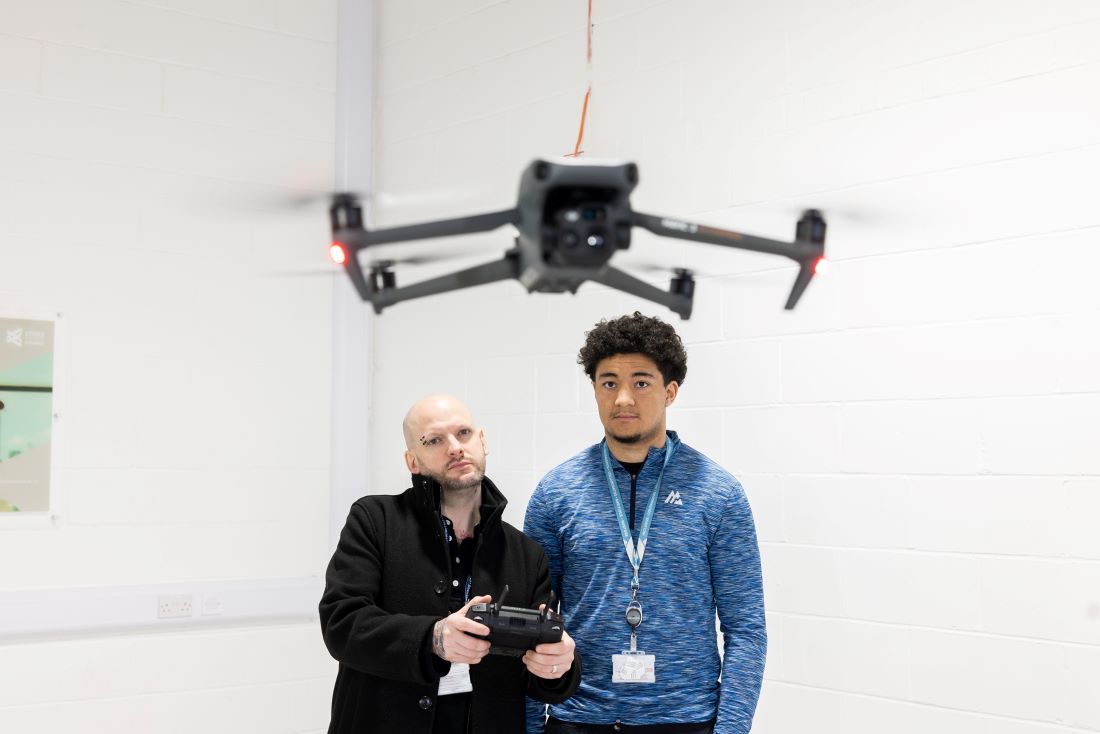£490 million skills training boost to help get more people into jobs

- Multimillion pound investment to radically improve university and college facilities and provide better teaching for students.
- Critical subjects to benefit, with state-of-the-art medical suites along with cutting edge engineering and science labs.
- Students to get skills they need for rewarding careers while businesses will have access to skilled workers into the future.
Students are to benefit from state-of-the-art medical suites along with cutting edge engineering and science labs, in a multimillion-pound investment in university and college facilities.
Universities and colleges across England will benefit from almost £490 million, giving their students access to world-class facilities and enabling them to offer more high-quality training opportunities that will set them on a path to a great career.
One hundred colleges and universities have today (8 December) been awarded a share of £432 million to invest over the next three years in state-of-the-art facilities and equipment and help level up more opportunities for people to gain the skills they need to progress.
Meanwhile, £57 million has also been awarded to 20 higher education providers for 2022/23, who specialise in areas including science, agriculture, business as well as creative and performing arts. This funding will support them to offer a wider range of high-quality courses including specialist courses in cancer research, public health and tropical diseases.
The Prime Minister, Rishi Sunak, said:
“Investing in education and skills will unlock future growth, boost productivity and help build the skilled workforce of the future.
“That’s why we’re spending £490 million to support high-quality teaching and world class facilities in universities and colleges right across the country.
“Whether it’s in aerospace engineering or green tech, this funding will provide young people with the support they need to build a great career.”
Education Secretary Gillian Keegan said:
“This investment is about making sure students get the highest quality training in key subjects which are driving economic growth. That means access to top of the range facilities which prepare people for the workplace, filling skills gaps and levelling up the whole country.
“From Yeovil to Durham, we are backing the industries of the future and giving people the skills they need to succeed.”
Students will have access to high-quality training environments in vital subjects including engineering, medicine and science that will help get more people into jobs with higher wages, plug local skills gaps and support economic growth.
Projects include:
- Yeovil College has been awarded £1.2m to invest in facilities and equipment for the teaching of hydrogen cell technology in aerospace engineering, to ensure students can learn and retrain at the forefront of developments in cell technology and net-zero.
- Bradford College has been awarded £5.8m for their Garden Mills project, which will create flexible training and educational facilities for digital, science, and allied health subjects.
- Grantham College has been awarded £1.08m to refurbish and outfit an engineering innovation centre with cutting-edge mechanical, manufacturing and hydraulics engineering equipment and will enable them to run a new suite of higher education short courses in high demand subjects.
- The Centre for Health and Social Equity at the University of Northumbria at Newcastle has been awarded £5.8m to support nursing and incorporate clinical skills laboratories, simulation wards, home environment rooms, and specialist areas for midwifery and allied health subjects
- £5.8m for a new design and engineering facility at the University of Plymouth that will improve the teaching capacity and capabilities as part of the university’s investment in STEM teaching.
Susan Lapworth, chief executive of the OfS, said:
“Investing in modern buildings and innovative equipment will help universities and colleges in England prepare students for their future careers. Modern labs and state of the art technology help students learn with the best facilities. The investment will also increase the provision of short courses that provide flexibility to boost the skills of the workforce.
“Competition for funding was strong, with high-quality applications from across the sector. The OfS-funded projects will ensure current and future students have a positive experience while studying expensive-to-deliver subjects that are strategically important to society. Taxpayers will feel these benefits too, as the investment will boost local and regional economies and support environmental sustainability.
The multi-million pound investment allocated today builds on the £150 million provided to higher education providers by the OfS in 2021/22 which has supported projects including:
- Aston University that received more than £800 million to support the development of high-quality, cutting-edge, clinical simulation facilities for Aston Medical School and Aston Pharmacy School.
- The University of Warwick was awarded more than £1.5 million to invest in five initiatives to support its STEM Grand Challenge to enhance current and future teaching and learning of students in STEM disciplines, including undergraduate, postgraduate taught and degree apprenticeships, and creating new cross-faculty programmes.
- Coventry University was also awarded £2 million to complete and equip a new build to house allied health courses and allow for the growth of nursing and allied health courses.
Sector Response
Jill Gates, Vice President, Culture and People, Europe and Asia at Ensono:
“The £490 million skills training boost represents another critical step in diminishing the skills gap while improving the lives of thousands across the UK. It is imperative that we continue to invest in skills development and higher education, building a robust workforce of tomorrow that is able to grow and support the UK’s economy. High-quality environments, equipment, and courses are integral to developing the necessary skills needed to help someone land a job and continue to progress throughout their career.”
“When looking at avenues for a potential career, it is essential that the workforce of tomorrow remember that there are different paths that can lead to fruitful careers. For anyone looking for a career in STEM but lacking the academic standards, or funds, to attend university, apprenticeships open a significant door. As an industry, we must encourage the various pathways to begin a career. In doing so, we will continue to build diverse and influential tech leaders of the future.”
Notes
- The funding allocated today is for the 2022-23 to 2024-25 FY and consists of £399 million awarded through a competitive bidding exercise and an allocation of £11.2 million per year distributed via a formula.
- In total, the OfS received 203 bids requesting a total of £830 million. Successful capital bids had to demonstrate good value for money, effective project management and environmental sustainability. Bids also needed to demonstrate how they met one or more priority categories. These were:
- Category one: High-cost subjects of strategic importance. These subjects include laboratory-based subjects in science, technology and engineering, and healthcare disciplines in medicine, dentistry, nursing, midwifery and allied health professions, veterinary science and archaeology
- Category two: Enhancement of graduate employability and skills needs of employers and industry and therefore local and regional economies, in particular in supporting technical provision at Levels 4 and 5
- Category three: Part-time and other forms of flexible provision to include the development of higher education short course study.
- Applications from world leading universities and colleges that have been allocated a share of £57million to support specialist providers were reviewed by an independent panel comprised of experts from various fields. The successful bids had to demonstrate how they met specific criteria. These are:
- The provider has a genuine and ongoing reputation, nationally and internationally, for teaching in its specialism that is world-leading and this is supported by evidence
- The knowledge and skills of the provider’s graduates, and the enduring impact they have on the professions and industries for which they have been prepared, are recognised by other world-leading providers, leading employers, external funders and others in the UK and beyond
- The provider’s students, graduates and teaching practitioners contribute to the development of their particular specialisms in a way that is recognised internationally, or create the new industries, techniques or art forms of the future
- The provider’s world-leading status is integral to its specialism and often small size.











Responses